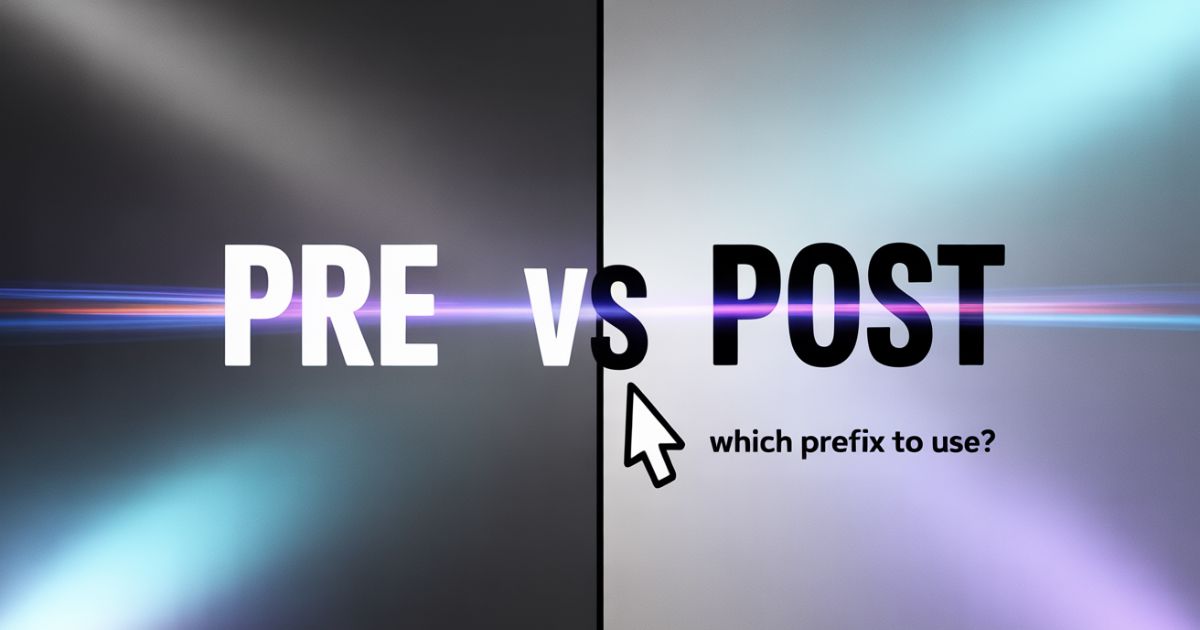In the world of English prefixes, few pairs are as commonly confused as “pre-“ and “post-“. These short additions to words seem simple, but their meanings can shift the entire message of a sentence. Whether you’re writing an academic paper, composing an email, or chatting in casual conversation, knowing when to use “pre-” and when to use “post-“ can make a significant difference.
In this article, we’ll explore the definitions, uses, and real-life scenarios involving these prefixes so you can be confident in your word choices.
Understanding the Basics of “Pre-” and “Post-“
Let’s start with the foundations.
- “Pre-“ means before. It comes from Latin and is used to indicate that something happens prior to an event or condition.
- “Post-“ means after. It also originates from Latin and signals that something occurs following an event.
Simple, right? But in practice, the lines get blurry when we use these prefixes with various nouns and adjectives.
Commonly Confused Terms with “Pre-” and “Post-“
Let’s take a look at some words that often cause confusion and see them in action with scenarios to make their meanings crystal clear.
Prewar vs Postwar
- Prewar means before a war, usually referencing a specific one like World War II.
- Postwar means after a war.
Scenario:
“My grandmother still has her prewar wedding dress from the 1930s. It’s in perfect condition.”
“The architecture in this part of the city is mostly postwar, built quickly to house returning soldiers.”
Notice how the time context changes dramatically with just a few letters.
Preoperative vs Postoperative
These are commonly heard in medical contexts.
- Preoperative means before surgery.
- Postoperative means after surgery.
Scenario:
“The nurse gave me detailed preoperative instructions, including fasting for 12 hours.”
“During the postoperative period, I had to take antibiotics and avoid strenuous activity.”
Here, the prefixes mark crucial phases in medical care, where clarity is essential.
Prenatal vs Postnatal
These terms refer to the time surrounding the birth of a child.
- Prenatal = before birth.
- Postnatal = after birth.
Scenario:
“She took prenatal vitamins throughout her pregnancy.”
“The hospital provides postnatal support for new mothers adjusting to life with a newborn.”
When talking about pregnancy and infant care, choosing the correct prefix avoids serious misunderstandings.
Why “Pre-” and “Post-” Get Confused
So why do these words trip people up? One reason is context. In casual conversation, we sometimes forget how precise these prefixes are. Another issue is that some words don’t have both forms, or they might not be commonly used.
For instance, you’ll often hear “prelaunch” in marketing or business but rarely hear “postlaunch” outside specific industries. This inconsistent usage can throw people off.
Additional Examples to Clarify Usage
Let’s go over a few more examples with clear context:
Prepaid vs Postpaid
- Prepaid: You pay before using a service.
- Postpaid: You pay after using a service.
Scenario:
“I bought a prepaid phone plan so I wouldn’t have to worry about monthly bills.”
“He prefers a postpaid plan where he gets a bill at the end of the month based on his usage.”
In telecom services, knowing the difference can impact your finances.
Preexisting vs Postexisting (rare)
- Preexisting means already existing before a certain point.
- Postexisting isn’t common, but can be inferred to mean coming into existence afterward.
Scenario:
“The insurance won’t cover preexisting conditions.”
(Less common) “These changes are the result of postexisting complications after treatment.”
Here, while “postexisting” isn’t often used, you can see how linguistic logic still applies.
Premarital vs Postmarital
- Premarital = before marriage.
- Postmarital = after marriage.
Scenario:
“They signed a premarital agreement outlining financial responsibilities.”
“They went on a lavish postmarital honeymoon in Bali.”
The choice of word here is tied to legal and emotional milestones.
Tips to Remember the Difference
When in doubt, ask yourself:
- Is this happening before or after the main event?
Use that question to guide your prefix choice. Here are a few memory tricks to help:
- “Pre-” sounds like “prepare”, and you usually prepare before something happens.
- “Post-” sounds like “postpone”, and you postpone things to a later time—after something else.
Prefixes in Formal vs Informal Settings
You’ll find “pre-” and “post-” more often in formal or technical language—medical, legal, or academic writing. That said, they’re increasingly common in casual settings too:
- “Pre-party” and “post-party” are now regular in social talk.
- “Pre-workout” supplements are popular at the gym.
Just remember, even if you’re speaking casually, the core meanings don’t change.
The Power of Prefixes
It’s easy to underestimate how much meaning a prefix adds. With “pre-” and “post-“, these few letters tell us when something occurs, which can radically alter the message. Consider these examples:
- “She had preexisting doubts.” vs. “She had post-event doubts.”
- “We made preemptive changes.” vs. “We made post-crisis corrections.”
In each case, the timing of action or thought changes the tone—and often the outcome—of the situation.
Summary: Choosing the Right Prefix
Here’s a quick cheat sheet:
| Prefix | Meaning | Example Word | Usage |
|---|---|---|---|
| Pre- | Before | Preflight | “The pilot conducted a preflight check.” |
| Post- | After | Postflight | “They analyzed postflight data for issues.” |
When you encounter a situation where timing is essential surgery, payment, contracts, or events make sure you’re using the right prefix to avoid confusion.
Final Thoughts
English is full of nuance, and “pre-” vs. “post-“ is a perfect example of how a tiny change can reshape meaning. The next time you’re unsure, take a second to think: Are you referring to something before or after?
Once you understand the timeline behind your words, the choice becomes much easier—and your communication more precise.


